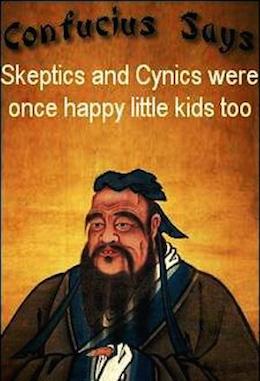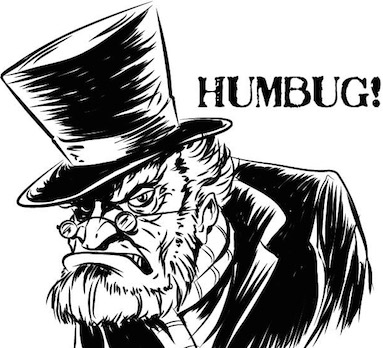Plenty when it comes to sorting out the nuances of alternative and/or investigative journalism. Because in order to excel at either of the above two, one needs to bring to the table what amounts to – let’s just call it – a suspicious mind.
In yesterday’s Star Magazine, my pal Cindy Hoedel – one of the world’s nicest human beings – writes about a study published by the American Academy of Neurology that found that cynics were two and one-half times as likely to develop dementia.
“As a card-carrying optimist, I have two reactions to the finding: Relief at not being in the high-risk group, and surprise that no one hit on the connection between cynicism and dementia before,” Cindy writes. “I’ve always thought of cynicism as its own type of dementia, a self-administered toxic drip that skews perception and stunts learning.”
Now back to the journalism connects…
There’s a fine line between what some people view as cynicism and skepticism.
Most mainstream journalists I worked with and got to know at the Kansas City Star are largely more like Cindy – pretty positive and not wildly skeptical.
Oh they have their moments, especially when it comes to topics like politics and political correctness. But largely the dirt diggers and hard question askers and take-no-bullshit types are in the vast minority.
 In part because of the nature in which the print journalism game is generally played.
In part because of the nature in which the print journalism game is generally played.
If a reporter has a beat and gets too testy or aggravates an important source – say the media and PR staffer who can control to a large extent access to needed news or information – the reporter is likely to find his or herself frozen out of big stories that other media then scoop them on.
That’s doesn’t go over well with the editors.
Take the time the newspaper pissed off the Chiefs in the 1990s and were frozen out of some seriously huge player developments in retaliation. Or say local theater exhibitor AMC feeds a big story to the Wall Street Journal and the Star has to settle for sloppy seconds along with the rest of the media pack. Right here in AMC’s home town!
It happens.
The bottom line being that playing nicey nice – in other words, playing it safe – is not just the path of least resistance, it’s a surefire way to stay out of trouble with editors.
Another reason most reporters that I know with don’t tear into more potentially edgy stories is that it’s just not in their makeup. Print journalism on the small stage – Kansas City ranks 31st in size – is generally a pretty low paying field of endeavor. Oh, it beats McDonald’s and Target, but even in its hey day (prior to the past five years), because most newspapers operate as virtual monopolies, they tend to pay very low wages to reporters.
 I had to crawl into the newsroom for the paltry sum of like 24 grand, for example, before clawing my way to a low six-figures, a rarity for a non sports writers or Pulitzer winners.
I had to crawl into the newsroom for the paltry sum of like 24 grand, for example, before clawing my way to a low six-figures, a rarity for a non sports writers or Pulitzer winners.
You know, where else are reporters gonna go? Out of town is generally the only option, although with the mass layoffs of recent years they’ve been showing up (oddly) in PR positions and local TV news staffs.
And the type of folks who are drawn to these low wages with increasingly few opportunities for upward ($$$) mobility don’t tend to be in-your-face types.
Of course, there are people like Cindy who prefer to pursue stories that are largely uplifting in nature. Nothing wrong with that.
The losers in the timid news game are the readers and as well as the people and communities that might benefit from increased scrutiny on businesses, individuals, government and organizations that are, let’s just say, overly opportunistic.
You know, and evil doers.
We live in a world where public relations has evolved into a highly scientific art form. Where blowing smoke, spinning bad news and tap dancing your way around embarrassing faux pas has become de rigueur. The PR people of today know how to play the game and are often better at it than the newsies. Because with the odd exception, nobody wants to take responsibility or cop to practically anything bad anymore.
So if you don’t have a reasonably skeptical mind and a willingness to do a little investigating and ask the tough questions, you’re not going to get to the bottom of any number of stories – even positive ones.
 Take the time a few years back when a well-connected downtown developer was trying to muscle tiny Gallup Map on Main into selling its property for the developer’s price while reportedly implying that its City Hall connections might force the sale if Gallup didn’t take its offer.
Take the time a few years back when a well-connected downtown developer was trying to muscle tiny Gallup Map on Main into selling its property for the developer’s price while reportedly implying that its City Hall connections might force the sale if Gallup didn’t take its offer.
However Gallup didn’t want to sell.
Meanwhile, another reporter at the Star was aware of the situation but had a very comfortable relationship with the developers and had been sitting on the story, waiting to write a done deal news account trumpeting how wonderful a new downtown grocery there would be.
I turned in my column laying out Gallup’s side of the story and called the developer for comment.
Well, guess what happened?
My call was never returned, instead the developer called the beat writer who beseeched the acting editor – the main editor was at a retreat – to kill my column and let him write a front page story once the deal was done.
My editor and I fought to keep my column in, but the business reporter was able to broker a compromise in which we wrote a co-byline front page story together. And so he chatted up the developer, added in some of my comments from Gallup buried halfway or more in on the jump, and the story ran with a blow job headline and initial thrust about how great the new development would be.
Gallup and I got screwed as did most of the general public – which might have risen up in support of Gallup- but probably never even read that far into the story to realize there was even a controversy.
I was able to take up Gallup’s case in subsequent columns and the family-owned map company at 1733 Main prevailed and survives to this day.
In the above case, a healthy dose of skepticism, not worrying about pissing off a valuable source and a willingness to tackle a controversial subject resulted in a very positive outcome for a “little guys.” The flip side of that, Kansas City did not get its much-wanted downtown grocery store that everybody (including the Star reporter) had been rooting for.
However years later it all worked out.
Downtown developers got their tax breaks, people living downtown got an ultra hip, upscale grocer at 13th and Main, Gallup’s still in biz and its real estate is probably worth substantially more than when it was in an so-called blighted part of downtown.
By definition a cynic is “a person who believes that only selfishness motivates human actions and who disbelieves in or minimizes selfless acts or disinterested points of view.”
Cindy seems to see these people as losers, self made toxic types with minimal perception skills and stunted learning abilities. It’s almost as if they deserve their dementia, since she thinks “of cynicism as its own type of dementia.”
That’s a little cold for someone as caring as Cindy but whatever.
A skeptic on the other hand is defined as “a person who questions the validity or authenticity of something purporting to be factual.”
See the fine line?
And if we proceed to definition No. 2 of a skeptic, it gets even finer:
“A person who maintains a doubting attitude, as toward values, plans, statements, or the character of others.”
The $64 million question: Are skeptics like myself, damed to end up in Cindy’s Dementia Hell (or are they already there as she suggests)?
Time will tell, I guess.
I do think there’s a significant difference between the two words, however small or arguable it may be. You know, journalistically.
Then again, a glance at my Thesaurus reveals the unthinkable. That “skeptic” is a synonym for “cynic.”
Oh well…













You need cynics and skeptics around to point out that the research itself is bogus, the results based on a statistical error. Unfortunately this junk science will probably follow us around for a long time.
http://www.economist.com/news/briefing/21588057-scientists-think-science-self-correcting-alarming-degree-it-not-trouble
Nice article Hearne. It would seem dimentia is unavoidable.
The Progressive Main Stream Media is, has been and always will be in the bag for liberal causes. Cynics are forged in the fires held to their feet by self aggrandizing politicians, who, with the mewling, lap dog 4th Estate, safely esconced in thier pockets, continue to aquire sinecure in Academy, Education, Journalism, Entertainment and Public Sector Employment through the largesse of the American taxpayer. In Chicago, where the assaults, riots and thuggery now taking place every week on Michigan Ave and throughout the city is endemic, appearance, as usual, is paramount in the media’s portrayal of their favorite son.
This type of hubris and callous indifference to any semblance of unbiased journalism is typical of the latitude granted for those on “The Team.”
“Chicago Land” (Executive Producer, Robert Redford) was supposed to be a CNN Documentary on the mayor of Chicago, Rahm Emanuel.
“The Chicago Tribune gained access to over 700 emails between Chicago Mayor Rahm Emanuel’s office and CNN. The emails detail a cozy relationship between the Democrat’s office and the cable news network during the production of “Chicagoland,” a low-rated eight-part cable series pitched to viewers as an unvarnished look at the city. [The emails are posted here.]
The emails tell the story of a cable news network coordinating with the mayor of a failing city who is also a rising Democrat star. The apparent goal of “Chicagoland” was for CNN to use its resources as a way to portray the “mayor in a positive light” at a national level and showcase Emanuel “as the star he really is.”
According to the Tribune, details were coordinated down to camera angles:
If it seemed as though some scenes of CNN’s documentary series “Chicagoland” were coordinated by Mayor Rahm Emanuel’s City Hall and the show’s producers, that’s because they were.
More than 700 emails reviewed by the Tribune reveal that the production team worked hand in hand with the mayor’s advisers to develop storylines, arrange specific camera shots and review news releases officially announcing the show.
Producers asked the mayor’s office to help them set up key interactions in what the cable network has billed as a nonscripted eight-part series, including Emanuel’s visits with the school principal who emerged as a star of the show, emails show. …
The production team for the series, whose final episode aired Thursday night, told Emanuel’s staff that particular scenes would present the mayor in a positive light, with one of the producers expressing a desire to showcase the mayor “as the star that he really is.”
Our president’s cozy relationship with the press over the last 6 years, have done this country great harm in my opinion and birthed an epidemic of cynics on thier way to hospitals operating under the aegis of the Federal Government. That should work out.
Hmmm, some evidence that the Academy was correct.
It’s because journalism, specifically print and the objective/old school kind, is well on the way to become obsolete like the typewriter.
A company’s communications or PR department undoubtedly controls today’s information. We journos are at the behest of this corporate control in order to get a story. It’s a shame that many reporters, both print and broadcast, are jumping ship and becoming traitors by joining this trend. In some respects I don’t blame them, though, considering the significant difference in pay among the two fields.
But the damn thing is there will always be news; the means of getting it has just changed. The problem also being that the majority of information goes through a corporate filter before being released.
That’s why I don’t understand the flack of writing a blog. It still can be a legitimate source of news; just apply your J-school knowledge.
…HARLEY? Take note. You better happy up or you are going to be walking around Loose park in your speedos dragging a fake Christmas tree.